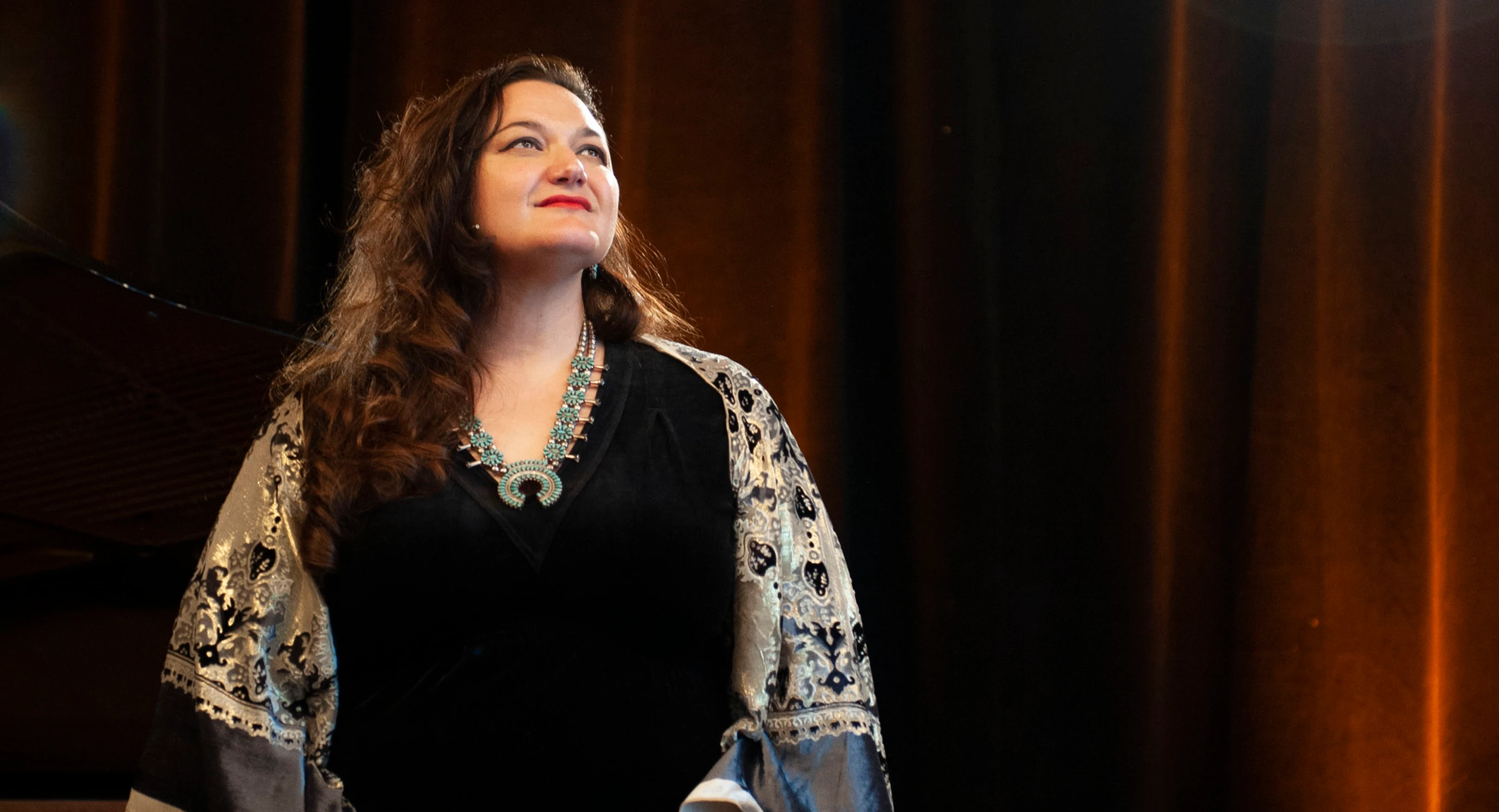
- Details
- By Elyse Wild
Kirsten C. Kunkle (Muscogee Creek Nation) fell in love for the first time when she was 12 years old. She remembers exactly where she was: the Toledo Opera Association in Toledo, Ohio.
Kunkle was enchanted.
"I just fell in love with the spectacle of it," Kunkle said. "I fell in love with the costumes and the hair and the makeup and just this grandiose singing that I had never really heard before. I fell in love with the opera."
The love has lasted. Today, Kunkle, 42, is the nation's leading Native American soprano. This March, she is bringing her celebrated vocals to the Chicago Fringe Opera, where she’ll perform a series of songs created in part with words from her Native ancestor and songs that honor the Indigenous tribes of Chicago.
Kunkle joins the opera company for “Chicago Currents: Celebrating Chicago Waterways,” a full-length concert celebrating the land and water that Chicago is built on, featuring an ensemble of five singers, piano and violin.
For her part, Kunkle will perform songs that honor the city's Indigenous peoples as well as the “Posey Songs,” a series of compositions set to poems of her ancestor, Creek Nation journalist, satirist and poet Alexander Posey.
Kunkle grew up surrounded by the arts. Her mother was a pianist and a ballet dancer who idolized the famed Osage ballerina Maria Tallchief.
When Kunkle was a child, her schedule was filled with voice training, piano lessons, dance lessons and theater classes.
Kunkle continued training with a vocal coach, honing her voice to one day perform the art form that captivated her as a child. She attended Bowling Green State University and the University of Salzburg for her undergraduate studies, majoring in voice performance with minors in Italian and German. She later obtained her master's and doctoral degrees in voice performance from the University of Michigan.
While studying for her doctorate, Kunkle was inspired to create a recital from Posey's work.
"I was looking for something unique and special," Kunkle said. "There is not a lot of repertoire in classical music for vocalists to be doing anything with a Native American background. I'd always grown up knowing his work."
Kunkle has carved a path that has led her to the upper echelons of classical performance. Today, she is included on the list of Classical Native American Artists and Musicians at the Smithsonian Institution's NMAI and the Molto Native Music list of performers. In addition, her recordings are collected at the Library of Congress, the National Museum of the American Indian at the Smithsonian Institution (NMAI), and the Merkel Area Museum in Merkel, Texas. In 2016, she co-founded the Willmington Concert Opera, where she continues to serve as artistic director.
She is also included on the list of Classical Native American Artists and was featured as a composer and soloist for the Circle of Resilience concert with Intermountain Opera Bozeman in May 2021.
Kunkle notes that her career path has been unconventional.
"I didn't win the Met competition at an early age or anything like that," she said. "I took opportunities that arose. I've tried things I never thought I would, which include composition."
That unconventional path led Kunkle to perform an original song, "Reclaim the Land," at All Nations Teepee Village at Madison Junction in Yellowstone National Park on August 24, 2022, for Yellowstone Revealed, a series of art and place-based projects designed by tribal nations and Mountain Time Arts.
In footage of the performance, Kunkle stands in front of the teepee village — meant to represent the 27 affiliated tribal nations of the Yellowstone area — and her haunting soprano carries over the landscape.
"That was the highlight of my life," Kunkle said. "Not just of my career, but of my life. It felt poignant not only to bring my heritage to Yellowstone, but on every level to be able to represent Muskogee Nation and get to sing my own words and my own music."
Kunkle will perform with the Chicago Fringe Opera on Sunday, March 19, Tuesday March 21, Friday, March 24, and Saturday, March 25. For ticket information, visit chicagofringeopera.com.
More Stories Like This
Watermark Art Center to Host “Minwaajimowinan — Good Stories” ExhibitionMuseums Alaska Awards More Than $200,000 to 12 Cultural Organizations Statewide
Zuni Youth Enrichment Project Takes Top Emerging Artist Apprentices to Phoenix for Artistic Exploration and Cultural Immersion
From Dishwasher to Award-Winning Chef: Laguna Pueblo's Josh Aragon Serves Up Albuquerque's Best Green Chile Stew
Rob Reiner's Final Work as Producer Appears to Address MMIP Crisis
Help us defend tribal sovereignty.
At Native News Online, our mission is rooted in telling the stories that strengthen sovereignty and uplift Indigenous voices — not just at year’s end, but every single day.
Because of your generosity last year, we were able to keep our reporters on the ground in tribal communities, at national gatherings and in the halls of Congress — covering the issues that matter most to Indian Country: sovereignty, culture, education, health and economic opportunity.
That support sustained us through a tough year in 2025. Now, as we look to the year ahead, we need your help right now to ensure warrior journalism remains strong — reporting that defends tribal sovereignty, amplifies Native truth, and holds power accountable.
 The stakes couldn't be higher. Your support keeps Native voices heard, Native stories told and Native sovereignty defended.
The stakes couldn't be higher. Your support keeps Native voices heard, Native stories told and Native sovereignty defended.
Stand with Warrior Journalism today.
Levi Rickert (Potawatomi), Editor & Publisher

